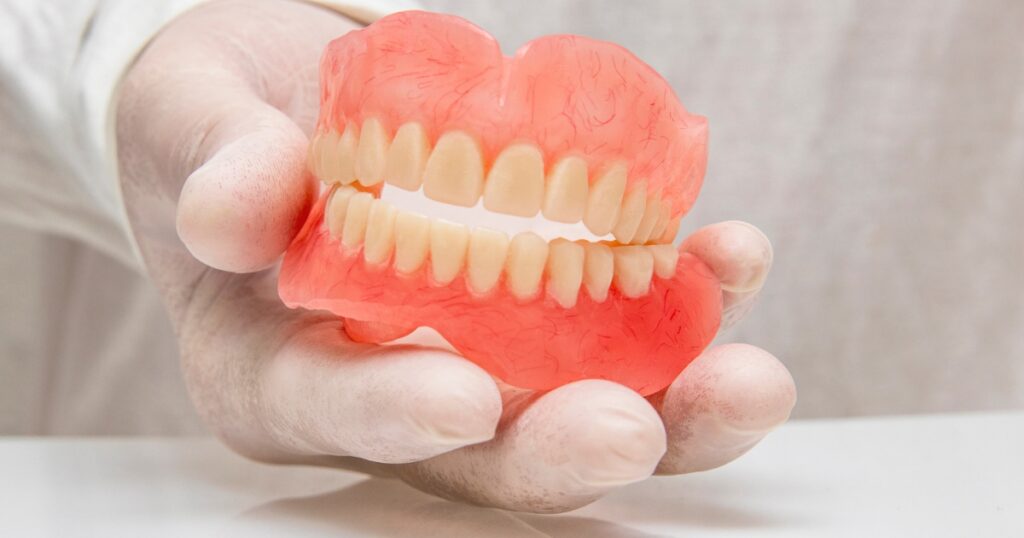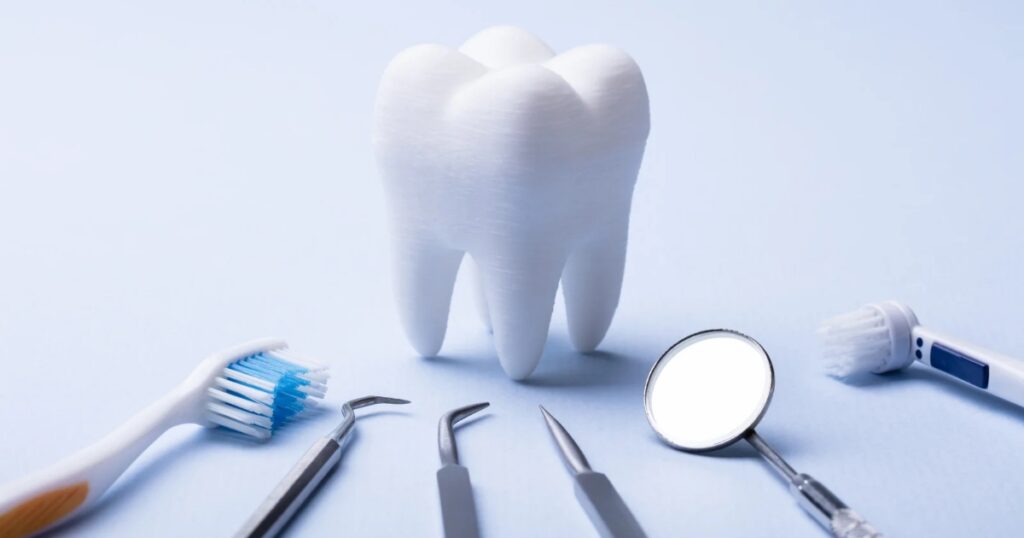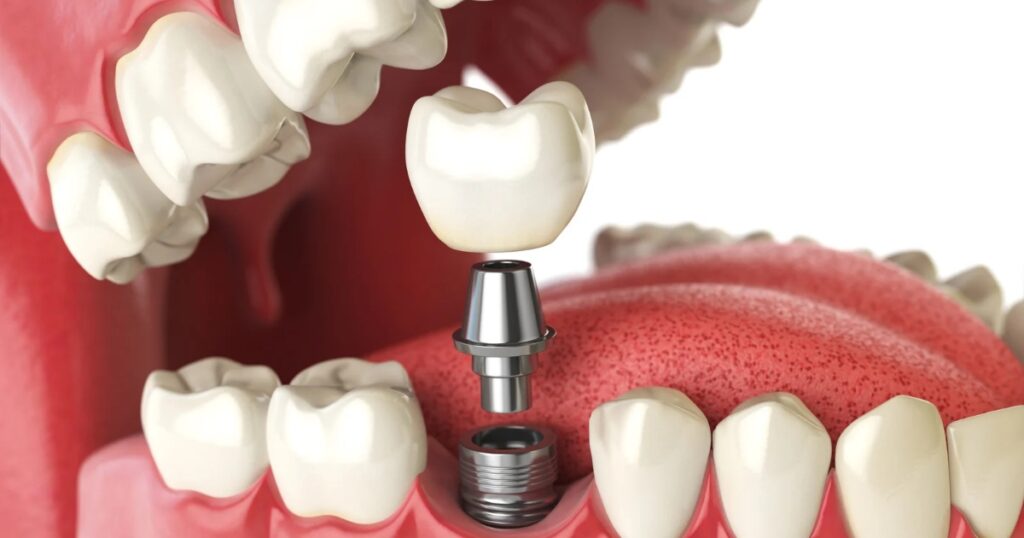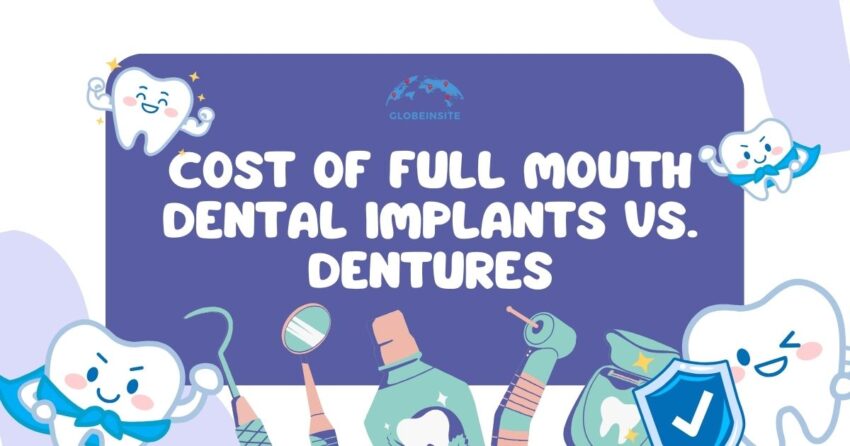Full mouth dental implants vs. dentures: Compare costs, durability, maintenance, and long-term value to make the best choice for your dental restoration.
Introduction
Thinking about restoring your smile but unsure whether to choose full mouth dental implants or dentures? You’re not alone. Both options offer solutions to missing teeth, but understanding the cost, durability, and long-term investment is crucial before making your decision. Today, we’re breaking down everything you need to know about the cost of full mouth dental implants versus dentures, so you can make an informed choice that fits your needs and budget.
What Are Full Mouth Dental Implants?
Full mouth dental implants include supplanting each of the teeth in your mouth with an extremely durable, fixed arrangement. This procedure typically involves inserting titanium posts into the jawbone, which act like artificial tooth roots. Over time, the bone fuses with these posts, creating a sturdy foundation for attaching a full arch of prosthetic teeth.
The implants are designed to be long-lasting, durable, and mimic the look and feel of natural teeth. The procedure is more invasive than dentures but provides a permanent solution to tooth loss.

What Are Dentures?
Dentures are a removable option for replacing missing teeth. They come in two main types: full and partial. Full dentures replace all the teeth on the upper or lower jaw, while partial dentures fill gaps where some natural teeth remain. They lay on the gums and can be taken out and cleaned consistently.
While dentures are a less invasive option than implants, they don’t offer the same level of stability or comfort and may require adjustments or replacements over time.
Key Differences Between Dental Implants and Dentures
So, what sets these two options apart?
Durability: Dental implants can last decades, while dentures typically last 5-10 years before needing to be replaced.
Comfort: Implants feel more natural, as they are securely anchored in the jawbone. Dentures, on the other hand, can sometimes slip or cause irritation.
Aesthetic Appeal: Implants closely resemble natural teeth and don’t require adhesives to stay in place, whereas dentures may have a more noticeable look.
Initial Costs of Full Mouth Dental Implants
The cost of full mouth dental implants can be significant. On average, the price for a full set of implants ranges from $20,000 to $50,000. This includes the cost of:
Surgery: Placing the titanium implants in your jawbone
Materials: High-quality crowns, abutments, and prosthetics
Specialist Fees: Consultations and expertise from oral surgeons or periodontists
Implants are certainly an investment, but their longevity and the benefits they provide may outweigh the upfront costs for many.

Initial Costs of Dentures
In contrast, dentures are typically more affordable. The average cost for a full set of dentures ranges from $1,500 to $3,000, depending on the materials and design. This price includes:
Fabrication: Custom-made dentures to fit your mouth
Fittings and Adjustments: Appointments to ensure the dentures fit comfortably
Materials: Dentures made from resin or acrylic
Dentures may be more cost-effective upfront, but it’s important to remember that they will likely need to be replaced every few years.
Longevity and Durability: Implants vs. Dentures
When comparing the two, full mouth dental implants stand out in terms of longevity. Implants can last a lifetime with proper care, while dentures often need to be replaced every 5-10 years due to wear and changes in the shape of the mouth.
If you’re looking for a long-term solution, implants are the way to go, even if the initial investment is higher.
Maintenance Costs for Full Mouth Dental Implants
Full mouth dental implants require regular dental visits for cleanings and check-ups, but their maintenance is similar to that of natural teeth. Brushing, flossing, and routine dental cleanings are essential to ensure the implants stay in good condition.
Overall, the maintenance costs for implants are minimal compared to dentures.

Maintenance Costs for Dentures
Dentures, on the other hand, come with more maintenance. You’ll need cleaning solutions, special brushes, and regular adjustments to ensure a proper fit. Additionally, over time, dentures can become damaged and require repairs, adding to the overall cost of maintenance.
Comfort and Functionality: Which Feels Better?
In terms of comfort, dental implants are far superior to dentures. Since they are secured into the jawbone, they function just like natural teeth. You won’t have to worry about slipping or discomfort while eating or speaking.
Dentures can feel less stable, especially as they age and the fit changes. This can affect your ability to eat certain foods or speak clearly.
Aesthetic Considerations
Implants also offer better aesthetic results. They are designed to look and feel like real teeth, and since they are permanent, you won’t have to worry about taking them out or using adhesives. Dentures, while functional, may not always provide the same natural look, especially after years of wear.

Which Option Is More Cost-Effective in the Long Run?
While dentures are cheaper upfront, dental implants may prove to be more cost-effective over the long run. If you factor in the replacement and maintenance costs of dentures, implants could end up saving you money in the long term.
The Psychological and Emotional Impact
Beyond the practical and financial aspects, implants can have a significant mental effect. Many people report feeling more confident and secure with implants because they look and function like real teeth, whereas dentures may feel less natural and secure.
Conclusion: Making the Right Choice for You
In the end, the choice between full mouth dental implants and dentures depends on your budget, long-term goals, and personal preferences. Implants offer a permanent, more natural solution, while dentures are a more affordable, temporary fix. Consider your lifestyle, finances, and the value you place on comfort and aesthetics before making your decision.

FAQs
1. Are dental implants painful to install?
The procedure is typically done under anesthesia, so pain is minimal during the surgery. Some discomfort may occur during recovery, but it is manageable with medication.
2. How long do dentures typically last?
Dentures generally last between 5 to 10 years, depending on how well they are cared for and the changes in your mouth structure over time.
3. Can implants be financed over time?
Yes, many dental practices offer financing plans that allow patients to spread out the cost of implants over several months or even years.
4. What is the recovery time for full mouth implants?
Recovery from implant surgery can take anywhere from a few weeks to several months, depending on the individual and the complexity of the procedure.
5. Which option requires more maintenance?
Dentures require more maintenance, including daily cleaning and periodic adjustments, while implants need care similar to natural teeth, such as brushing and flossing.
Read More: What’s the Average Legal Expense for Small Business?

